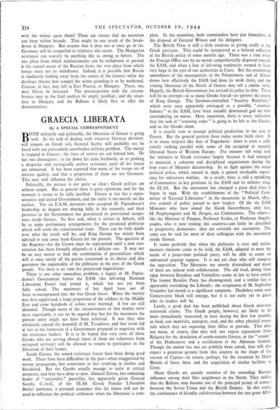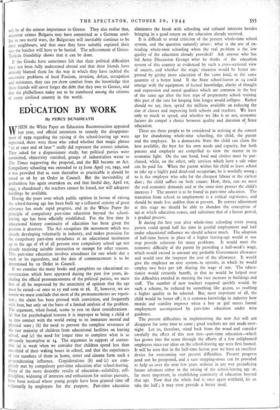GRAECIA LIBERATA
By A SPECIAL CORRESPONDENT
BOTH militarily and politically, the liberation of Greece is going well. In his task of dealing with whatever German divisions still remain on Greek soil, General Scobie will probably not be faced with any particularly unorthodox military problem. The enemy is trapped in Greece ; the lines of retreat are cut behind him. He has two alternatives: to lay down his arms forthwith, or to prolong a desperate and strategically useless resistance until all his forces are exhausted. It has been reported that many of his troops are of inferior quality, and that a proportion of them are not Germans. This may well influence his choice.
Politically, the picture is not quite so clear ; Greek politics are seldom simple. But in general there is great optimism, and for the moment it seems to be fully justified. Greece at last has a repre- sentative and united Government, and the unity is not merely on the surface. The six E.A.M. ministers who accepted M. Papandreou's leadership in August are sharing fully in his counsels, and their presence in the Government has guaranteed its provisional accept- ance inside Greece. Its first task, when it arrives in Athens, will be to make preliminary arrangements for the promised plebiscite which will settle the constitutional issue. There can be little doubt now what the result will be, and King George has wisely been advised to stay away from Greece for the present. The question of the Regency—for the Crown must be represented until a new con- stitution has been formally adopted—is a delicate one. It may not be an easy matter to find the combination of personalities which will at once satisfy all the parties concerned in its choice and also guarantee the impartiality of the plebiscite in the eyes of the Greek people. Yet there is no time for protracted negotiations.
There is one other immediate problem, a legacy of M. Papan- dreou's Government before the EAM (the left-wing National Liberation Front) had joined it, which has not yet been fully solved. The mutineers of last April have not all been re-incorporated into the free Greek forces. When the mutiny was first suppressed, a large proportion of the soldiers in the Middle East and some hundreds of sailors were interned. A few are still detained. Though many of the circumstances of that mutiny were most regrettable, it can yet be argued that but for the mutineers the present unity might not have been achieved. It was they who ultimately caused the downfall of M. Tsouderos, and that event led at last to the formation of a Government prepared to negotiate with the resistance leaders. It is to be hoped that very soon all those Greeks who are serving abroad (most of them are volunteers from occupied territory) will be allowed to return to participate in the liberation of their homes.
Inside Greece, the armed resistance forces have been doing good work. There have been difficulties in the past—often exaggerated by enemy propaganda, but sometimes in fact resulting in clashes and bloodshed. But the Greeks usually manage to unite at critical moments, and they have done so now. General Zervas, last remaining leader of " nationalist " guerrillas, has apparently given General Sarafis, C.-in-C. of the ELAS (Greek Popular Liberation Army) partisans, a personal assurance that his forces will not lys used to influence the political settlement when the liberation is corn-
plete. In the meantime, both commanders have put themselves at the disposal of General Wilson and his delegates.
The British Press is still a little cautious in giving credit to the Greek partisans. This could be interpreted as a belated reflection of the British policy of some months ago. There was a time when the Foreign Office was by no means sympathetically disposed towards the EAM, and when a fear of left-wing tendencies seemed to loom very large in the eyes of our authorities in Cairo. But the astonishing smoothness of the reoccupation of the Peloponnese and of Athens shows how effectively the EAM had done its work there, and the coming liberation of the North of Greece may tell a similar story. Happily, the British Government has revised its policy in time. There will be no attempt—as so many Greeks feared—to sponsor the return of King George. The German-controlled " Security Battalions," which were once apparently envisaged as a possible " counter- balance " to the EAM, have been roundly denounced and are now surrendering en masse. More important, there is every indication that the task of " restoring order " is going to be left to the Greeks, and to the Greeks alone.
It is usually rash to attempt political predictions in the case of Greece. But the general pattern there today seems fairly clear. It is in many respects like that of Yugoslavia : there is even a suffi- ciently striking parallel with some of the occupied or recently liberated States of Western Europe. The extreme left wing took the initiative in Greek resistance largely because it had managed to maintain a coherent and disciplined organisation during the four years of Metaxist dictatorship. In its fight against the secret political police, which started in 1936, it gained invaluable experi- ence for subversive warfare. As a result, there is still a sprinkling of Communists in key positions in the EAM and its military wing_ the ELAS. But the movement has changed a great deal since it began in 5941. With the establishment of the " Political Com- mittee of National Liberation " in the mountains in March, effec- tive control of policy passed to new leaders. Of the six EAM Ministers who have joined the Greek Goverriment, only two, M. Porphyrogenis and M. Zevgos, are Communists. The others— like the Minister of Finance, Professor Svolos, or Professor Angelo- poulos, who is now visiting this country.—can fairly be described as progressive democrats : they are certainly not extremists. The same can be said for most of their colleagues with the movement inside Greece.
It seems probable that when the plebiscite is over and parlia- mentary elections come to be held, the EAM, adapted to meet the needs of a peace-time political party, will -be able to count on substantial popular support. It is not yet clear who will compose the opposition. The Metaxists are utterly discredited and many of them are tainted -with collaboration. The old feud, dating from 1909, between Royalists and Venizelists seems at last to have ended. The former Royalist Party has disintegrated, and a similar fate is apparently overtaking the Liberals: the resignation of M. Sophocles Venizelos last month is a significant symptom. Doubtless some new Conservative block will emerge, but it is too early yet to guess who its leaders will be.
Lately, a good deal has been published about Greek post-war territorial claims. The Greek people, however, are likely to be more immediately interested, at least during the first few months, in food, raw materials, transport, seed, and the other physical essen- tials which they are expecting their Allies to provide. That does not mean, of course, that they will not expect reparations from Bulgaria for the desolation of north-eastern Greece, or the " return of the Dodecanese and a rectification of the Albanian frontier. Though the matter has not yet publicly been raised, they will also expect a generous gesture from this country in the shape of the cession of Cyprus—in return, perhaps, for the retention by Great Britain of bases there and the acquisition of similar facilities in Crete.
Many Greeks are acutely sensitive of the extending Russian influence among their Slav neighbours in the North. They realise that the Balkans may become one of the principal points of contact between the Soviet Union and the British Empire. In this event, the continuance of friendly collaboration between the two great Allic' will be of the utmost importance to Greece. They also realise that, whatever crimes Bulgaria may have committed as a German satel- lite in two world wars, the Bulgarians will inevitably continue to be their neighbours, and that once they have suitably expiated their sins the hatchet will have to be buried. The achievement of Greco- Turkish friendship shows that it can be done.
If the Greeks have sometimes felt that their political difficulties have not been fully understood abroad and that their friends have unjustly blamed them for the way in which they have tackled the successive problems of local Fascism, invasion, defeat, occupation and resistance, they can yet draw comfort from the knowledge that those friends will never forget the debt that they owe to Greece, and that the philhellenes today are to be numbered among the citizens of every civilised country in the world.



























 Previous page
Previous page